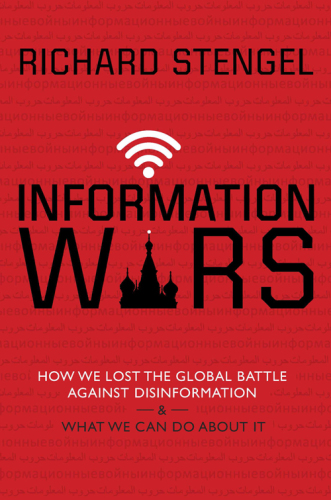
Information Wars
How We Lost the Global Battle Against Disinformation and What We Can Do About It
کتاب های مرتبط
- اطلاعات
- نقد و بررسی
- دیدگاه کاربران
نقد و بررسی

July 15, 2019
In this somewhat choppy memoir, Stengel, the former editor of Time, recounts his three years as a political appointee in President Obama’s State Department focusing on the weaponization of information. He describes the department’s sometimes but not always successful responses to ISIS’s videos of journalist beheadings, Boko Haram’s mass kidnapping of girls in Nigeria, and the growth of Russian disinformation through state-led infotainment networks such as RT. He also chronicles the department’s efforts to track anti-American disinformation across social media platforms—and social media platforms’ slow responses—and eventually creating the Global Engagement Center to counter foreign propaganda and disinformation efforts. A running thread is Stengel’s unfavorable comparisons of the State Department, where he was frequently stymied by slow-moving bureaucracy, to his previous life in the private sector, despite the snafus he regularly created at the State Department when he acted on his impulses. The final, strongest section of the book introduces ways to reduce the impact of disinformation and propaganda, including real-time disclosure of who’s paying for political ads and more transparent sourcing in news reporting. Readers interested in how disinformation fits into today’s foreign affairs landscape will want to give this a look. Agent: Joy Harris, Joy Harris Literary Agency.

September 1, 2019
Former Time editor Stengel (Mandela's Way: Lessons on Life, Love, and Courage, 2010, etc.) offers a gloomy view of America's efforts in the "battle of ideas" with Russia, the Islamic State group, and other entities. We "still don't know how to fight" disinformation, writes the author, who served as Under Secretary of State for Public Diplomacy and Public Affairs from 2013 to 2016. "The truth is, it's impossible to stop people from creating falsehoods and other people from believing them." In this refreshingly frank account, Stengel describes his stint in the byzantine State Department, where he focused on countering IS messaging and Russian disinformation in the last years of the Obama administration. With great clarity, he recounts the hurdles he encountered: bureaucratic procedures, acronyms and government-speak, endless vetting and turf battles, all of which slowed efforts to bring his print-oriented office into the era of social media. Foreign-service officers with no media experience insisted it was "easy" to create content. He was also greatly hampered by the very openness of American society, which info-savvy IS and Putin used to their advantage. Most of his book details the creation of a messaging coalition with Arab nations to thwart incessant "out-tweeting" by "digital jihadis" bent on undermining the U.S. with messages and videos on kidnappings and beheadings of Americans. "Not everyone can afford an F-35," writes Stengel, "but anyone can launch a tweet." Even so, few in government were tweeting. One exception, social media guru and Ambassador to Ukraine Geoff Pyatt, warned, "we are being out-messaged by the Russians....They don't feel the need to be truthful." Stengel relates the thinking of participants in the information war in ways that bring the dangers of this global messaging onslaught home. He notes how IS migrated to the dark web as a result of U.S. counterefforts, and he argues that artificial intelligence has great potential to detect and delete false information. A revealing look at America's difficult struggle to combat false, misleading narratives.
COPYRIGHT(2019) Kirkus Reviews, ALL RIGHTS RESERVED.

September 15, 2019
It was during Stengel's tenure as undersecretary of state for public diplomacy and public affairs for President Obama in his second term that the public witnessed the emergence of fake news and its repercussions on national and global levels. In this astute account, Stengel, former editor of Time, plots the mechanics and layout of a labyrinthine governmental organization as he implements measures to counteract the dissemination of disinformation that threatens the U.S. and other democracies around the world. As a Washington insider and former journalist, Stengel writes from a rare and illuminating double perspective. It is this duality that led to his initiating prescient actions which combated the onslaught of junk news perpetuated by ISIS and Russia on social media, hence the apt title of this fascinating book. Stengel's recounting of the events and individuals, including Putin and Trump, involved in the surge in and fight against propaganda and misinformation is jarring yet hopeful as he concludes with a blueprint for remedy and change.(Reprinted with permission of Booklist, copyright 2019, American Library Association.)

August 9, 2019
In a time when we are awash in information, some of it manipulated and untrue, Rhodes scholar Stengel (former U.S. undersecretary for public diplomacy and public affairs; editor, Time) shares his experiences in public service, navigating the challenge of coping with the spread of misinformation through an open democratic society. Appointed undersecretary of state for public diplomacy and public affairs in 2013, the author served through the end of President Obama's administration. Here he thoughtfully details his time working within the State Department to promote American ideals in the face of an array of disinformation generated by Russia and others during and before the 2016 U.S. election. VERDICT This sobering book is indeed needed to help individuals better understand how information can be massaged to produce any sort of message desired. Recommended for general political science and current affairs collections.--Ed Goedeken, Iowa State Univ. Lib., Ames
Copyright 2019 Library Journal, LLC Used with permission.

























دیدگاه کاربران